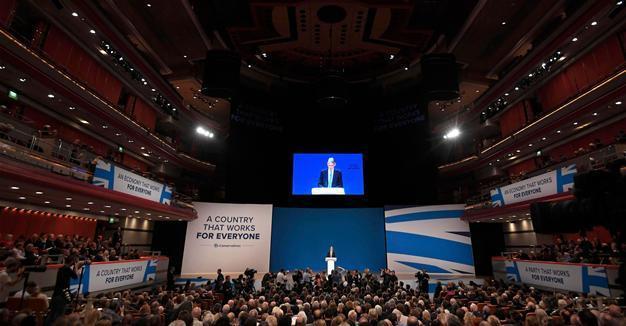Britain’s Hammond promises new economic plan to handle Brexit turbulence
BIRMINGHAM-Reuters

REU Photo
Britain needs a new fiscal plan to navigate economic turbulence caused by Britain’s vote to leave the European Union, finance minister Philip Hammond said on Oct. 3, stressing the need to balance spending cuts with infrastructure investment.
On Oct. 2, British Prime Minister Theresa May told the Conservative Party annual conference she would formally trigger the EU exit by the end of March next year, at which point Britain will enter into an initial two-year negotiating period.
“The Treasury will offer a guarantee to bidders whose projects meet U.K. priorities and value for money criteria, that if they secure multi-year EU funding before we exit, we will guarantee those payments after Britain has left the EU,” Hammond said in a speech to the Conservative Party conference in Birmingham.
He had previously pledged to guarantee the funding for projects signed prior to this year’s Autumn Statement, due on Nov. 23.
At that time, the commitment was worth around 4.5 billion pounds ($5.8 billion) in funding for agriculture, universities and some of the country’s regions.
Speaking ahead of his conference speech, Hammond said data from the first half of the year showed the economy was running at “eight out of 10,” but that business and consumer confidence could suffer during the long Brexit process.
“We must expect some turbulence as we go through this negotiating process,” Hammond told BBC television.
“There will be a period of a couple of years or perhaps even longer when businesses are uncertain about the final state of our relationship with the European Union and during that period we need to support the economy.”
He reiterated his decision to push back the government’s target to turn its 4 percent 2015/16 budget deficit - among the biggest of the world’s rich economies - into a surplus by 2020. He has yet to set a new target date.
“We need to keep the lid on day to day spending, we need to make government more streamlined and efficient but I do think there is a case that we should look at very carefully for targeted high value investment in our economic infrastructure,” he told BBC radio.
“In the short term it supports the economy, supports jobs, supports economic growth and in the long term it helps to make Britain more productive.”
